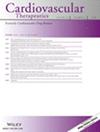孕酮通过MicroRNA-29b改变妊娠诱导的心肌细胞Kv2.1通道的适应性
IF 3.4
4区 医学
Q2 CARDIAC & CARDIOVASCULAR SYSTEMS
引用次数: 2
摘要
心血管系统的适应发生在怀孕期间,以确保母亲有足够的血液循环。孕酮(P4)被广泛用于支持妊娠的激素治疗,但对其对母体心脏功能的影响知之甚少。在本研究中,我们研究了妊娠受试者和小鼠模型中的心脏复极和离子通道表达,并研究了P4给药对这些妊娠介导的适应的影响。P4给药缩短了妊娠期QTC间期和动作电位持续时间(APD)的延长,这主要归因于基础条件下电压门控钾(Kv)电流的减少。体外研究表明,P4以双向方式调节Kv2.1通道。低剂量(1 μM),P4通过P4受体诱导Kv2.1上调,而在更高剂量(5 μM),P4通过靶向微小RNA-29b(miR-29b)下调Kv2.1。我们的数据显示,P4在妊娠期间通过调节Kv2.1通道活性来调节母体心脏复极。Kv2.1和miR-29b可能被用作适应母体心血管系统或评估妊娠期孕酮药物的潜在治疗靶点。本文章由计算机程序翻译,如有差异,请以英文原文为准。
Progesterone Changes the Pregnancy-Induced Adaptation of Cardiomyocyte Kv2.1 Channels via MicroRNA-29b
The cardiovascular system adaptation occurs during pregnancy to ensure adequate maternal circulation. Progesterone (P4) is widely used in hormone therapy to support pregnancy, but little is known about its effects on maternal cardiac function. In this study, we investigated the cardiac repolarization and ion channel expression in pregnant subjects and mice models and studied the effects of P4 administrations on these pregnancy-mediated adaptations. P4 administrations shortened the prolongation of QTC intervals and action potential duration (APD) that occurred during pregnancy, which was mainly attributable to the reduction in the voltage-gated potassium (Kv) current under basal conditions. In vitro studies indicated that P4 regulated the Kv2.1 channel in a bidirectional manner. At a low dose (1 μM), P4 induced upregulation of Kv2.1 through P4 receptor, while at a higher dose (5 μM), P4 downregulated Kv2.1 by targeting microRNA-29b (miR-29b). Our data showed that P4 modulated maternal cardiac repolarization by regulating Kv2.1 channel activity during pregnancy. Kv2.1, as well as miR-29b, might be used as potential therapeutic targets for adaptations of the maternal cardiovascular system or evaluation of progesterone medication during pregnancy.
求助全文
通过发布文献求助,成功后即可免费获取论文全文。
去求助
来源期刊

Cardiovascular Therapeutics
医学-心血管系统
CiteScore
5.60
自引率
0.00%
发文量
55
审稿时长
6 months
期刊介绍:
Cardiovascular Therapeutics (formerly Cardiovascular Drug Reviews) is a peer-reviewed, Open Access journal that publishes original research and review articles focusing on cardiovascular and clinical pharmacology, as well as clinical trials of new cardiovascular therapies. Articles on translational research, pharmacogenomics and personalized medicine, device, gene and cell therapies, and pharmacoepidemiology are also encouraged.
Subject areas include (but are by no means limited to):
Acute coronary syndrome
Arrhythmias
Atherosclerosis
Basic cardiac electrophysiology
Cardiac catheterization
Cardiac remodeling
Coagulation and thrombosis
Diabetic cardiovascular disease
Heart failure (systolic HF, HFrEF, diastolic HF, HFpEF)
Hyperlipidemia
Hypertension
Ischemic heart disease
Vascular biology
Ventricular assist devices
Molecular cardio-biology
Myocardial regeneration
Lipoprotein metabolism
Radial artery access
Percutaneous coronary intervention
Transcatheter aortic and mitral valve replacement.
 求助内容:
求助内容: 应助结果提醒方式:
应助结果提醒方式:


